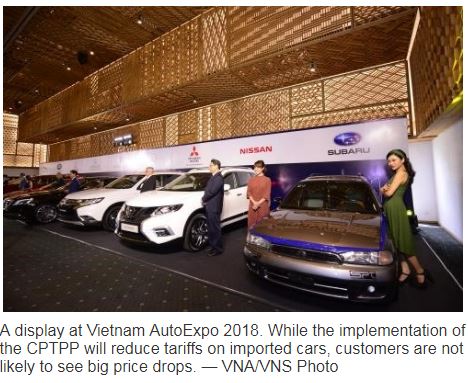Vietnam: CPTPP tariff cuts may not reduce auto prices
HANOI — The prices of imported automobiles in the Vietnamese market may not reduce as much as expected after the Comprehensive and Progressive Agreement for Trans-Pacific Partnership (CPTPP) came into effect on Monday, according to the Ministry of Industry and Trade.
Of 11 members of the CPTPP, which abolishes import tariffs on many products for its member countries, Vietnam imports cars from Japan and Canada.
As cars are categorised as a sensitive product, their import is still regulated strictly and must follow the set roadmap. Cars imported from Japan are mostly made by Lexus and Subaru, and include some Toyota models such as the Land Cruiser and Prado.
According to an official from the Ministry of Industry and Trade’s Multilateral Trade Policy Department who was quoted anonymously by vneconomy.vn, in addition to import taxes, vehicles are subject to a special consumption tax and other fees.
“If the import tax is reduced but the special consumption tax and other fees are increased, automobile prices will not decrease as expected,” he said.
He said this was a matter of balancing infrastructure and the number of vehicles, not a trade defence issue. The structure of automakers and importers also has a big impact, meaning the import tax would be never the only factor in determining car prices.
Under the CPTPP, Vietnam has pledged to reduce tariff barriers for cars from Japan and Canada in the seventh year from the date the agreement was signed. Imported cars from these two countries, if they meet origin standards, will be taxed at zero per cent following the annual reduction schedule.
The country will abolish import duties in the 13th year for new cars of all types. Cars with engine displacement capacity of 3,000cc or more will have a tax cut schedule in the 10th year.
It will also apply tariff quotas on old cars with an initial volume of 66 units. This volume will be gradually increased to 150 units from the 16th year. At the same time, the tax rate in quotas will drop to zero per cent in the 16th year, while the non-quota taxes will follow the import tax rate.
Auto imports down
Vietnam imported more than 81,600 cars at a value of US$1.8 billion in 2018, down 16.1 per cent in volume and 19.8 per cent in value compared with the previous year, according to a report from the General Department of Customs.
The decrease was due to several barriers from the Government’s Decree 116, which stipulates the conditions for production, assembly, import and business of automobile warranty and maintenance services, including requirements for Vehicle Type Approval (VTA) certificates, road tests and inspections of every batch of imported vehicles.
The volume of cars with nine seats or fewer was highest with over 53,980 units, worth more than $1 billion. This was followed by trucks with nearly 24,190 units worth $501 million.
Thailand was the largest source of the imports with 55,360 units, earning nearly $1.1 billion. Indonesia was next with 17,150 cars worth $269 million.
Vietnam spent over $3.5 billion to import components and auto parts of all kinds.
2018 car sales up
According to the Vietnam Automobile Manufacturers’ Association, total sales of the Vietnamese market increased by 5.8 per cent year-on-year in 2018 to 288,683 units. On average, each day Vietnamese people bought about 790 cars.
Passenger car sales reached 196,949 units, up 27.7 per cent. Commercial vehicles were next at 84,598 units, down 19.2 per cent. Finally, special-purpose vehicles saw 7,136 units sold, a decrease of 48.5 per cent.
Locally assembled cars had overwhelming had a majority of the market share, reaching 215,704 units, up 10.6 per cent. Meanwhile, imported cars are only one-third of the total revenue of VND73 trillion ($3.14 billion), down 6.2 per cent over the same period last year. — VNS
Source: http://vietnamnews.vn/economy/483835/cptpp-tariff-cuts-may-not-reduce-auto-prices.html#KMjHrbT36Jj7HhWX.99


 English
English




